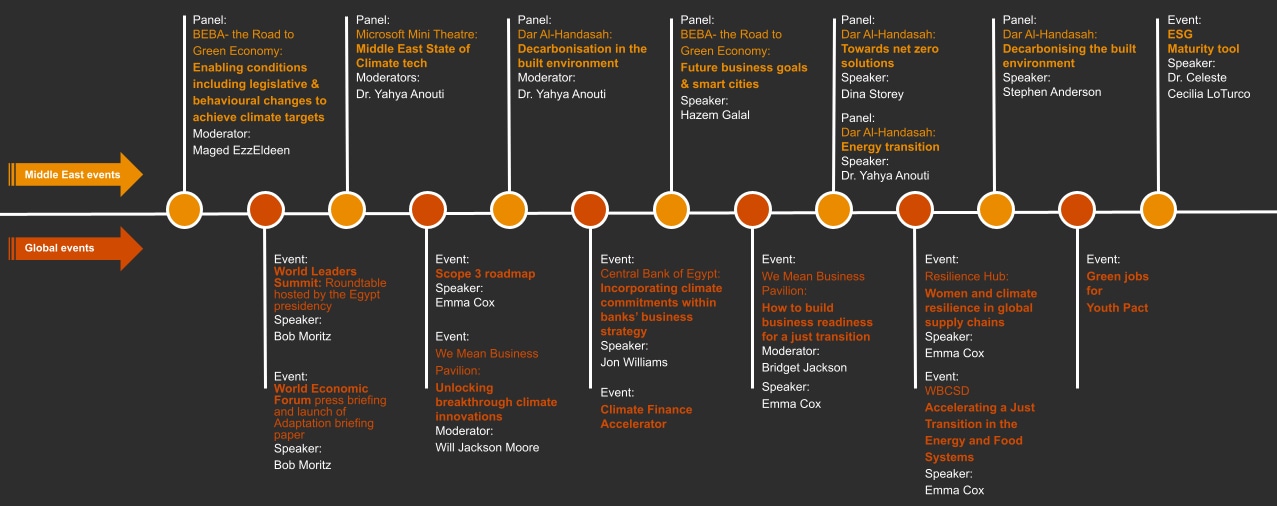Climate agenda in focus for our region
At PwC, we believe that climate change isn't just a challenge for tomorrow; it is also an opportunity for us to work together today in new, innovative ways to secure a cleaner, fairer future for all. As a purpose-driven Firm committed to building trust in society and solving important problems, we have supported the engagement of businesses and countries at the annual Conference of Parties (COP) for the last 10 years. This year, we look forward to actively contributing, and also learning, from the wealth of ideas, initiatives and knowledge exchange that will take place at the upcoming 27th Conference of Parties (COP27) in Egypt this November.

The convening of the COP27 at the crossing point between the Middle East with Africa and Europe is timely, and sheds light on the sustainability challenges of a region severely affected by climate change. For years, scientists have been warning that the Middle East is warming at twice the global average. If current trends continue, by 2050, the region will be four degrees warmer than the 1.5-degrees earmarked to save humanity. With only 1% of the earth’s total renewable water sources, the Middle East is the most water-stressed region in the world. Indeed, nine of the world’s ten most water-poor countries are based in here. This places water scarcity as a key priority and concern that has strong implications for food security and sustainability of livelihoods. Current water consumption patterns, reduced rainfall and desertification only compound these challenges for our dynamic region and its diverse, forward-looking youth demographic. Rather - and given the far-reaching implications of these sustainability challenges on poverty, gender and equality - it is no wonder that Middle Eastern governments, businesses and communities have important stakes on the outcomes of this important meeting of the minds.
The fact that COP27 will take place amidst a period of global disruption and crisis cannot be ignored. Governments participating in the COP27 do so while balancing difficult national policy choices against global pledges and commitments. In the West, this is centered on the need to manage the ongoing recession and the imperative for a fair and equitable recovery, alongside global stakes and commitments to the climate change agenda. Balance will also be a key theme for many of the GCC governments convening in the COP, as they balance their transition to renewable energy and the impact of current energy prices on global economies, against an energy security imperative that is funding the very livelihoods and transformation sweeping across their countries. Striking this balance is key to a successful COP27. Developing countries – particularly those in Africa on behalf of whom Egypt is convening the COP - will ask hard questions on the financial pledges made during the Paris Agreements of 2016 and the commitments of countries moving forward.
PwC Middle East’s commitment to the region extends beyond identifying the problems we may face. Our purpose is to bring together our community of solvers to innovate and ideate with governments, businesses and international stakeholders as they navigate and explore policy options, investments and new frontiers in technology to address these pressing challenges.
This report is a first step towards galvanising energy around COP27 in our region and an open invitation to governments and businesses to demonstrate leadership and act on the climate agenda. We look forward to engaging with you and our many other partners during and beyond COP27, for a better tomorrow for all.

Hani Ashkar
Middle East Senior Partner

Maged EzzEldeen
Egypt Country Senior Partner
What is COP27?
COP27 is the 27th Conference of the Parties (COP) of the United Nations Framework Convention on Climate Change (UNFCCC).
1994
21 March
The COP is the supreme decision-making body of the UNFCCC. COPs are held annually and all parties to the Convention attend to review and ensure the effective implementation of the Convention and any other legal instruments that the COPs may have adopted.
The UNFCCC is an international treaty which entered into force on 21 March 1994, when it became clear that climate change was an issue that could no longer be ignored and needed to be addressed on a global scale. Now, the UNFCCC has near-universal membership, as a total of 197 countries have ratified the Convention.
The UNFCCC aims to stabilise and maintain greenhouse gas concentrations in the atmosphere at a level that does not pose a risk of dangerous human-induced interference with the climate system.
A key task for the COP is to review the annual national inventories of greenhouse gas (GHG) emissions submitted by each country which is a Party to the Convention, as well as the climate change policies and measures they have taken to reduce them. Based on this information, the COP evaluates the effects of these measures against the current greenhouse gas concentrations, and assesses the progress made towards achieving the ultimate objective of the Convention.
2022
From 6-18 November
The Egyptian Government will host COP27, which marks the 30th anniversary of the adoption of the UNFCCC on behalf of the African continent in Sharm El-Sheikh from 6-18 November 2022.
Milestones in the evolution of the global response to climate change
The Paris Agreement is a legally binding international treaty on climate change, which was adopted in 2015 at COP21, and entered into force in 2016. The goal of the Paris Agreement is to limit global warming to well below 2°C, and preferably to 1.5°C. The Paris Agreement is considered a historic milestone because it binds countries together in their efforts over one common goal - to combat climate change and adapt to its effects.
To achieve the goal of the Paris Agreement and limit global warming, all countries must take increasingly ambitious climate action to minimize greenhouse gas emissions as soon as possible.

The Paris Agreement operates on five-year cycles, at the end of which each country must submit an updated version of their climate plans, called the Nationally Determined Contributions (NDCs). In these NDCs, the countries outline the actions they commit to take for the next cycle with a view to reducing their greenhouse gas emissions and simultaneously adapting and building resilience to the effects of the rising global temperatures. This cycle of periodically revising and updating the NDCs every five years is called the “ratchet mechanism” of the Paris Agreement. In addition to the NDCs, during the Paris Agreement, the 55 countries responsible for approximately 55% of the world’s greenhouse gas emissions committed USD100 billion in climate finance by 2020 and to continue to invest at this level until 2025.
Since COP21 in Paris, parties have been negotiating the Paris Agreement ‘rulebook’ - which sets out how the Paris Agreement will be operationalized, how action will be tracked, and how progress will be evaluated and reported on. The remaining elements of the ‘rulebook’ were successfully negotiated at COP26 including Article 6 on carbon markets, common time frames, and the enhanced transparency framework.

Notably, and beyond progress on the Paris Agreement rulebook, COP26 succeeded in creating a sense of urgency on climate action “in this critical decade”, which took the form of unprecedented commitment from corporates, institutions, and academia to reach climate change and sustainability goals. However, current climate plans – the Nationally Determined Contributions — are falling far short on ambition and the Glasgow Climate Pact called on all countries to present stronger national action plans by 2022, instead of in 2025, which was the original timeline.
A comprehensive two-year Glasgow-Sharm el-Sheikh Work Programme on the global goal of adaptation (2022-23) was also established, jointly carried by the Subsidiary Body for Scientific and Technological Advice (SBSTA) and Subsidiary Body for Implementation (SBI) decision.
Why is this COP so important and what are the crucial outcomes that we need from negotiations?
COP27 is essentially an African COP; and climate finance will take center stage as one of the most pressing, yet thorny issues that governments must address. Most of the developing countries - among them the countries of North and sub-saharan Africa - face significant funding gaps to manage the mitigation and adaptation measures that are urgently needed to address the growing climate crisis.

These countries are banking on the financial pledges and commitment of the top 55 countries responsible for greenhouse emissions to provide funding of USD100 billion per year as laid out in the Paris Agreements. This funding is essential in supporting the most climate vulnerable countries facing heightened threats of food insecurity, water scarcity and diminishing livelihoods. Despite this, in the past, progress on fulfilling these financial targets has been slow. In fact, the USD100 billion target has never been met: in 2021, a record USD80 billion was secured from both public and private sources.
One of the key asks of COP27 will be to follow up on the finance question, explore new finance goals and targets, and formalise processes to address “loss and damage” – a proposition that was made in COP26 and which the Group of the 77 (all the developing countries) and China have requested be added to the formal COP27 agenda. Concurrent to the provision of funding to the climate vulnerable, the onus will be on the recipients of the funds to demonstrate the inclusivity, fairness and integrity of the disbursement of the funds and the use for their intended purpose.

A lot can change in the span of a year – and this will certainly be the case in terms of progress on emission targets in COP27. The crisis in Ukraine and the ensuing global energy crisis has pushed several countries to explore fossil fuel options, in turn resulting in a backtrack on emissions targets in favor of energy security. On the other hand, the energy crisis has also demonstrated fossil fuel dependency and propelled the exploration and adoption of alternative, renewable energy sources.
COP27 will provide an opportunity to review progress towards emissions targets and assess whether the investments made to revert back to fossil fuels were a temporary move to secure immediate and pressing energy needs or if the return is permanent. Driving this process will be the United Nations’ Climate Change Secretariat’s report that will be released late October showing progress towards individual Nationally Determined Contributions and long-term strategies. Given current trends and the lack of progress to date, it is likely that the report will show a significant gap towards achieving the 1.5 degrees Celsius threshold needed.
Nevertheless, countries dialoguing and sharing information about progress in and of itself will be of critical importance to COP27, especially as it feeds into the Global Stocktake that was kickstarted in COP26 and will conclude in COP28. COP27 will provide an ideal platform for countries to reaffirm their commitment, highlight their action towards sustainable energy, and develop a common vision for moving forward on the climate agenda amid a turbulent, uncertain future.
Spotlight on Egypt's efforts to address and combat climate change:
The NDC's 2022 report, which shows Egypt's ambitious commitment to the global efforts despite the country's little responsibility for the world's historical GHG emissions, presents the wide range of climate policies and projects that Egypt has begun; such as:
Review your Internal Audit function to assess quality (via internal / external quality assurance reviews, maturity assessments and benchmarks), identify areas for improvement, and document an improvement plan aligned with the Internal Audit Code of Practice.
(2014-2023)
Sustainable Agriculture Investments and Livelihoods Project (SAIL)
(2013-2018)
Building Resilient Food Security Systems to Benefit the Southern Egypt Region
(2010-2018)
Participatory Development Programme in Urban Areas (PDP)
(2009-2017)
Adaptation to Climate Change in the Nile Delta through Integrated Coastal Zone Management
(2018-2024)
Enhancing Climate Change Adaptation in the North Coast and Nile Delta Regions in Egypt
PwC & COP27
PwC is supporting this critical event with a range of exciting and engaging content and activities from our Middle East and Global delegations. Highlights include:

Contact us









